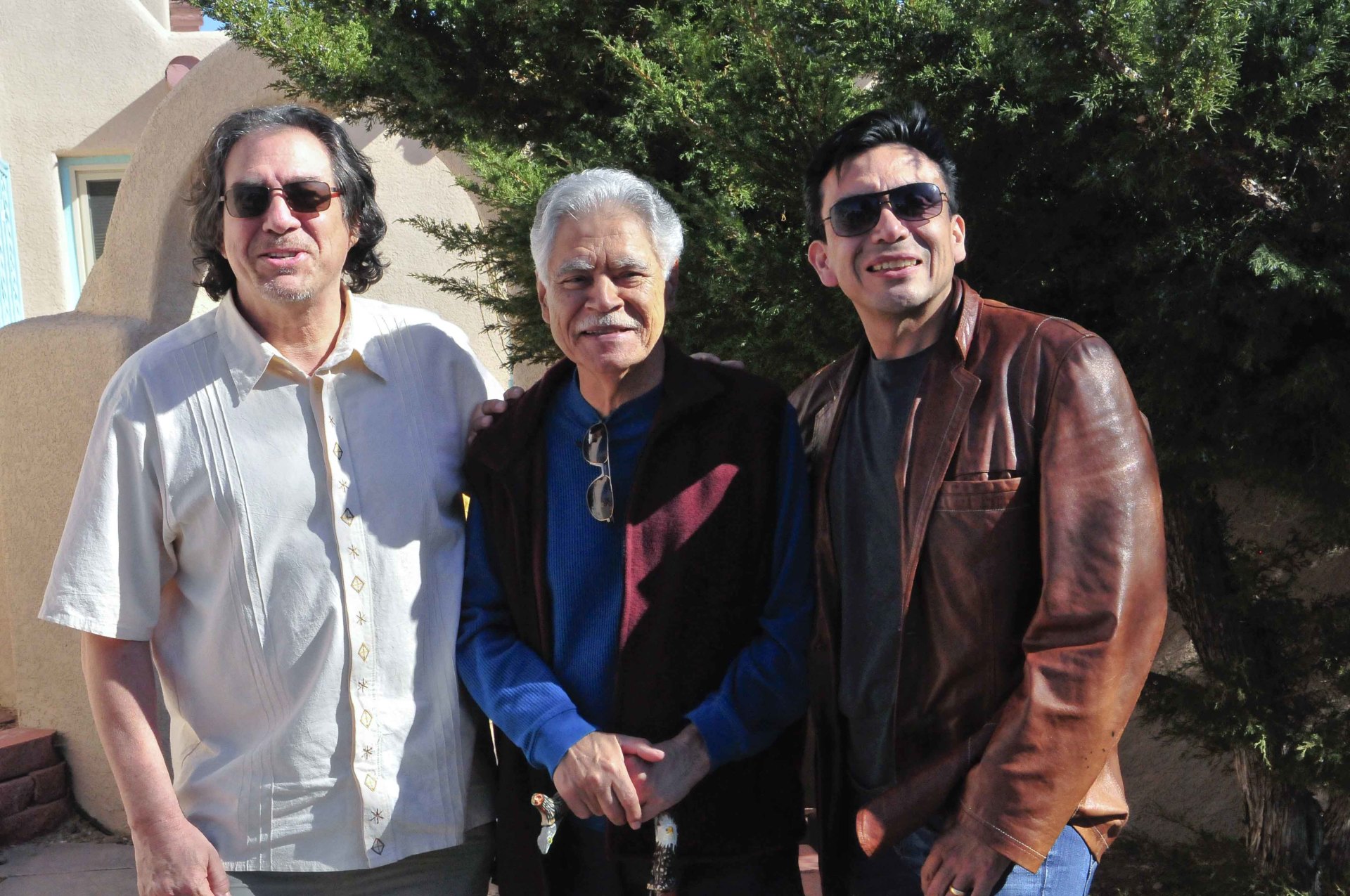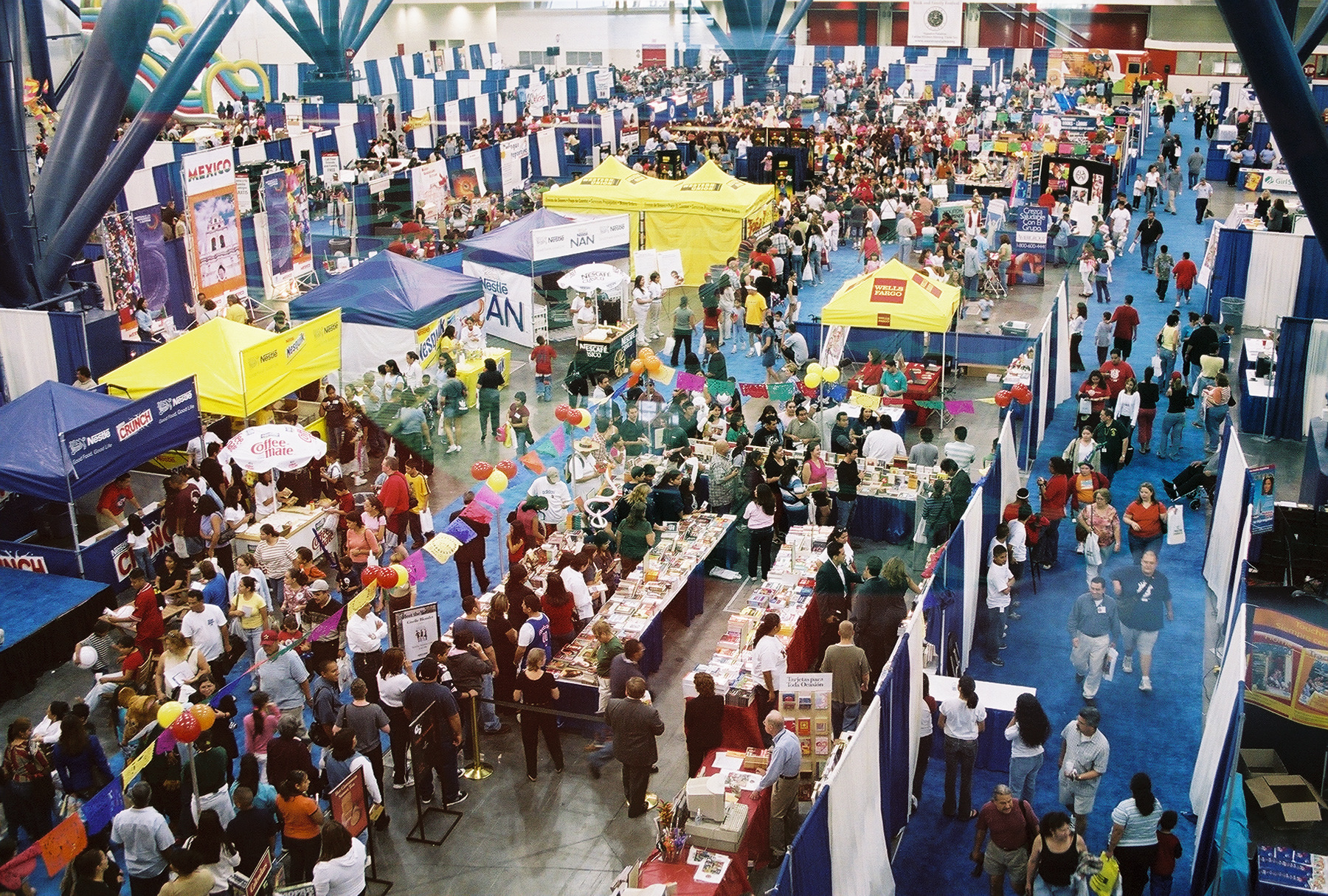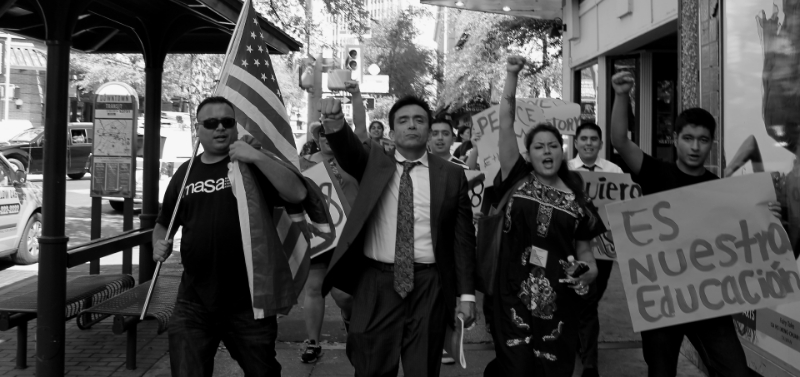Protect the Cultural Capital. Live on the dividends.
Banking on your interest as my hashtag trends.
How do I make my coin?
I coined a phrase “Somos Librotraficantes.”
I grew up on the south side of Chicago. With my broad shoulders and broader imagination, I could ‘a dedicated my life to busting skulls or opening minds. Lucky for you, I want to do time behind books.
It’s ironic because my folks told me that going to school would keep me out of trouble. Little did they know that those small doses of mind-altering prose were simply starter books. I would grow up to get into harder and harder stuff.
Worse, I became a kingpin of contraband prose.


Writers Dagoberto Gilb and Rudolfo Anaya, both banned in Arizona, with Tony Diaz, El Librotraficante. (Photo Credit: Liana Lopez)
I am just evil in nature. I suppose my parents could see this in me all along. They tried to save me. They sent me to a Catholic school. But not even the nuns, or the brothers, or the priests could change my evil ways- no matter how much they hit me.
So, no, reading Nathaniel Hawthorne’s “Young Good Man Brown” did not turn me into a young good brown man.
Instead I would turn All Quiet on the Western Front into “All Chillin’ on the West Side”.
I turned Macbeth into “Emcee Beth.”
I couldn’t stop myself no matter how much I was punished. There was no boundary to my imagination. I was always capable of the unimaginable.
I respected no limits.
I had to get out of Chicago for my own good.
Back when I was a kid and a punk would ask me why I was reading a book on the corner, I would reply, “It’s this or beat your ass”.
I will beat ya with the book.
I came to Houston to check out their literary cartels and to get my papers-an MFA, which stands for Mighty Fine Aztec.
I’m the first Chicano to get an MFA.
Of course, it made no sense to me that I would be the first Chicano to become a Mighty Fine Aztec in Tejaztlán. The sense that makes is non-sense. Texas is occupied Mexico.
Being from Chicago I can smell a racket a mile away. I wanted in on the action, so I started a gang.


The 2002 Houston Latino Book and Family Festival at the George R. Brown Convention Center, Houston, TX. Organized by Nuestra Palabra: Latino Writers Having Their Say
In 1998 I started our outfit—NP.
Our alias for the outside world was Nuestra Palabra: Latino Writers Having Their Say.
We were running the streets from day one. We had a crew of 200 capturing imaginations, stealing hearts, and breaking literary rules right and left.
By 2002, we were out of control going from monthly mitotes to larger and larger and larger joints.
We put on mega events, drawing 30,000 people at the George R. Brown Convention Center, attracting celebrity authors like George Lopez and Jorge Ramos in limousines at our disposal.
All they saw was money flying around. They saw capital being made in sales.
That was no big deal. You can sell anything. What I saw was our Cultural Capital building and building and building.
All the other players could fight for their cuts of the capital.
I knew we were monopolizing the real power, we were cultivating our Community’s Cultural Capital right under everyone’s noses.
And the outside world barely understood it. That meant we could just keep cranking out more and more Mighty Fine Aztecs, on our terms, our way, who would become Cultural Accelerators.
But that wasn’t enough. I needed more, and more, and more.
There, under the street lights, in the alley of the Convention Center, running our hands over the literary gold we were trucking across state lines, that our people were consuming in massive doses on the streets of Houston, I knew what we looked like.
And instead of being ashamed, it made me more flagrant.
And someone one asked me, if police roll up on us and ask us what we’re doing here so late, what do we say?
This time I said, “We tell ‘em “Somos Librotraficantes.”
And we became bigger and bigger, and more and more flagrant.
We took over the airwaves, broadcasting NP at 100,000 watts on 90.1 FM.
We took over social media while it was just coming of age.
We were on tv and conventional media.
Our addiction to Cultural Capital knew no bounds.
Of course, there were people watching who wanted to put us in check, but they couldn’t. Not just yet.
We did not know there were Mighty Fine Aztecs in Tucson, Arizona who were running Cultural Capital factories of their own on different fronts and at different scales, and they were about to be attacked.
Our destinies would soon be more directly linked.
I’ve told you before about Arizona’s Ban of Mexican American Studies. So, you know how we launched the 2012 Librotraficante to smuggle the books banned in Tucson back into Arizona.
But now you need to see the larger picture.


Activists from San Antonio, The Rio Grande Valley, and Houston demanding MAS in Texas. Photo (Credit: Zeke Perez)
The far-right Arizona Republicans who attacked our Cultural Capital were flagrant too. They accused our Community’s Cultural Capital of promoting the overthrowing of the government.
I know language rackets. They wanted Americans to think we would try to change the world violently because at that time it was hard to imagine us as intellectuals.
What was really happening was that some Republican politicians were scared of young Chicanas and Chicanos cracking the spines of books instead of each other. The far right knows how to control gang members but not Cultural Accelerators.
This ain’t a mystery novel.
So, I’ll ruin the ending.
Mexican Americans have directly experienced the power of cultural capital through two potent examples:
- In 2017, the Chicana/Chicano community overturned the banning of Mexican American Studies in Arizona
- In 2018, Chicanas and Chicanos advocated and succeeded in getting Mexican American Studies endorsed statewide by the Texas State Board of Education.
So now, I’m on to a bigger racket.
There’s a new game in town.
’m gonna be dropping weekly doses of Cultural Capital for our edification.
Spreading mind-altering prose to the entire nation.
Been to Arizona, guess now I’m a litigator.
Gonna run for office, guess I’ll be a legislator.
How do I make my coin?
I coined a phrase “Somos Librotraficantes.”
***
Tony Diaz is a writer, activist, professor and media personality. More at TonyDiaz.net. He tweets from @Librotraficante.



[…] I, like all Mexican Americans, was not born Chicano. My parents were migrant workers in Texas who then settled in Chicago. They handed down to me rich cultural traditions and values, but I had to discover our role in history on my own, through books that crossed my paths, through research I had to struggle to find and understand. […]